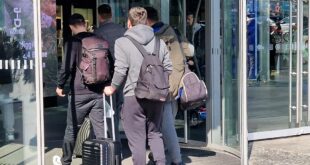More and more people are taking to small dinghies to cross the English Channel to the UK, in spite of the efforts on both sides to stop them. Many are desperate to escape unemployment and homelessness they experienced elsewhere in Europe. Marion MacGregor reports
This year, French maritime authorities say, at least 6,200 migrants have attempted to cross the English Channel from France in small boats. Over 4,000 have made it to the shores of the UK – the rest were intercepted by French authorities before they reached Britain. At least one person drowned in the attempt.
The number of people reaching English shores is low compared with the overall number of immigrants to the UK. The number of applications for asylum in Britain is also much smaller than in other European countries. (Last year, there were 46,055 asylum claims in the UK, which has a population of about 66 million, compared with 165,615 applications in Germany, with around 83 million people.)
However, the recent sharp rise in Channel crossings continues to alarm politicians in the UK. The Home Minister, Priti Patel, has taken a tough stance, saying she wants to make the route “unviable” and send boats back to France.
The Home Office has revealed that it might use a disused barracks in Folkestone in Kent to accommodate about 400 people who have arrived by boat. According to the local council, the issue of where the migrants will be housed has not been settled.
Why not stay in France?
The continued rise in the number of attempted migrant crossings comes despite the fact that the Channel is one of the world’s busiest shipping lanes and highly dangerous for small boats. This is partly due to tighter checks on trucks and lorries entering the UK, which have deterred people and smugglers and migrants from using this tactic.
Another reason that migrants continue to make the journey is that many of them have relatives or people they know in the UK, said Matthieu Tardis, an expert in migration policy at the French Institute of International Relations.
The English language, which is much more widely spoken than French, is another factor that draws migrants to Britain, Tardis explained in an interview with the news agency AFP. The difficult living conditions experienced by migrants in many European countries are also responsible, he added. “The bad conditions they experience in France, in Italy, in other EU countries, pushes them to go even further, to think that in the UK it will be better.”
The ‘death route’
Walid survived the 33-km-journey from France to Dover, paying a smuggler €3,000 to board a small rubber boat with a rickety engine.
He had travelled to France from Germany where he met Falah, a young Iraqi with two daughters. As the two men planned their escape from France, Falah told AFP: “Even if this journey is nicknamed ‘the death route’, we want to cross. We’re heading into the unknown – there is just God, the water and us.”
Walid, a stateless “Bidoon” tribesman from Kuwait, had already tried to cross the Channel three times. Twice, there were too many police patrols. The other time, the inflatable dinghy was torn, and the smuggler asked them to get off.
On Thursday, September 10, Walid finally reached Britain, where he told AFP he was determined to make a living. His friend Falah remained on the French side.
UK inquiry
The UK government is continuing to press France to intercept boats or to stop migrants from leaving. Meanwhile a Parliamentary inquiry underway in Britain into the reasons behind the growth in migrant crossings will look at how much authorities on both sides of the Channel are doing “to combat illegal migration and support legal routes to asylum.”
Tardis criticized previous bilateral agreements – estimated to have cost Britain at least €100 million – to fund increased border security on the French side to stop undocumented migrants from reaching the UK. As a result, many hundreds of people continue to live in makeshift camps in or near the French coastal city of Calais, the site of the infamous camp known as the Jungle which was officially closed in 2016.
“In a way, the British have exported their borders onto French territory, like we Europeans do in North African countries or Turkey,” said Tardis, adding that France should focus on creating legal ways for migrants to get to the United Kingdom, such as family reunion.
© InfoMigrants
 THE AFRICAN COURIER. Reporting Africa and its Diaspora! The African Courier is an international magazine published in Germany to report on Africa and the Diaspora African experience. The first issue of the bimonthly magazine appeared on the newsstands on 15 February 1998. The African Courier is a communication forum for European-African political, economic and cultural exchanges, and a voice for Africa in Europe.
THE AFRICAN COURIER. Reporting Africa and its Diaspora! The African Courier is an international magazine published in Germany to report on Africa and the Diaspora African experience. The first issue of the bimonthly magazine appeared on the newsstands on 15 February 1998. The African Courier is a communication forum for European-African political, economic and cultural exchanges, and a voice for Africa in Europe.

















